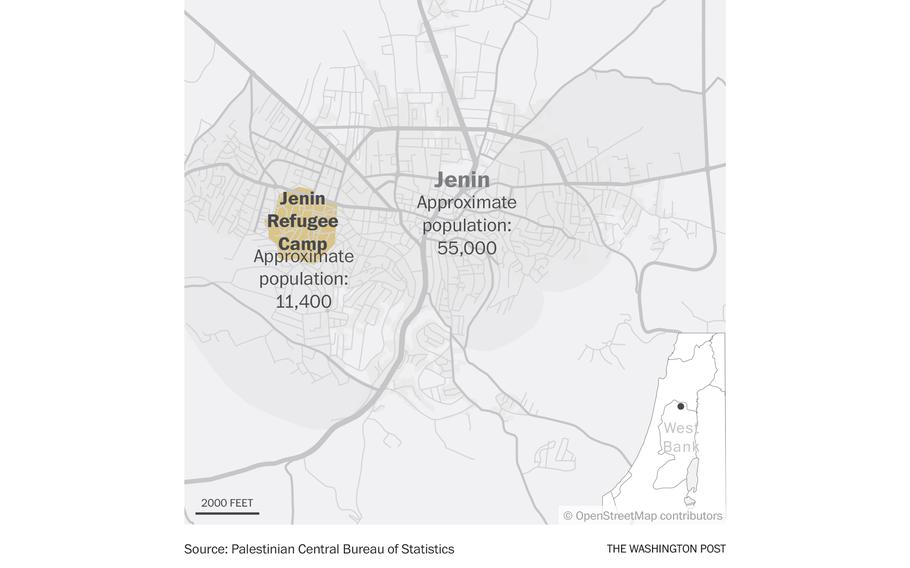Middle East
How Israel's raids on Jenin led to a major West Bank military operation
The Washington Post July 4, 2023

Israel’s far-right government, which came to power in December, has made it a priority to crack down on the refugee camp inside Jenin, which it says is harboring fighters who have carried out — or are planning to launch — attacks inside Israel. At least 50 attacks against Israeli citizens in recent months were launched from Jenin, according to the Israel Defense Forces, and 19 people participating in those assaults fled to the camp afterward. (The Washington Post)
Israel launched its largest military operation in the West Bank in two decades Monday in the city of Jenin, a hub of militant activity that Israeli forces have targeted repeatedly this year.
Israel's far-right government, which came to power in December, has made it a priority to crack down on the refugee camp inside Jenin, which it says is harboring fighters who have carried out — or are planning to launch — attacks inside Israel. At least 50 attacks against Israeli citizens in recent months were launched from Jenin, according to the Israel Defense Forces, and 19 people participating in those assaults fled to the camp afterward.
Formed in 1953 to hold Palestinians displaced by the 1948 Arab-Israeli war, the camp is now under the control of the Palestinian Authority. But the group's aging and unpopular leaders have struggled to rein in armed factions in Jenin and across the occupied West Bank.
Currently, 2023 is on track to be the deadliest year for Palestinians in the West Bank since the United Nations began recording fatalities in 2005, after the last Palestinian uprising. Between Jan. 1 and mid-June, 114 Palestinians were killed by Israeli forces, according to the United Nations; 16 Israelis were killed by Palestinians over the same period.
Since a January raid in Jenin, operations in the city have continued to escalate.
July 3
Monday's raid marked a huge escalation in Israeli operations in Jenin. Some 1,000 Israeli soldiers, assisted by drone strikes, stormed the city. At least eight people were killed and 80 were injured, according to the Palestinian Health Ministry.
Israeli officials said they were targeting an "operational command center" used by militants and did not indicate when the raid would end, a hallmark of past military campaigns in Gaza.
June 19
An Israeli raid aimed at arresting two suspected militants spiraled into a firefight that left five Palestinians dead and dozens wounded, including at least 91 Palestinians and eight Israeli soldiers and border police officers.
For the first time since the early 2000s, Israel dispatched a combat helicopter to help rescue the injured soldiers. The aircraft fired at Palestinian fighters on the ground to clear the area, the IDF said. Later that night, Israel launched a rare drone strike on a car carrying suspected militants on the outskirts of the city.
The next day, Palestinian gunmen opened fire at a gas station restaurant in Eli, an Israeli settlement in the West Bank, killing four people. Hamas, the militant group that controls the Gaza Strip, claimed credit for the attack, calling it a response to the raid in Jenin.
March 16
An elite Israeli unit, Yamam, killed four people, including two Palestinian militants and 14-year-old Omar Awadin, in a daytime raid on a crowded commercial street that Israeli officials said was intended to "apprehend terrorists."
A Washington Post investigation of video evidence and witness statements found that Awadin was one of 16 civilians in the area where Israeli forces fired at least 20 shots from AR-style rifles and a handgun. One of the militants was shot multiple times by Israeli agents after he was incapacitated — an apparent extrajudicial execution that experts said could violate Israeli law.
March 7
Israeli military vehicles swept into the Jenin refugee camp, searching for a man suspected of killing two Israeli brothers, ages 21 and 19, from the settlement of Har Bracha.
At least six Palestinians were killed and 26 others injured in the raid, according to the Palestinian Health Ministry. The IDF said the suspect was among the dead.
Jan. 26
A raid by Israeli forces in Jenin devolved into an hours-long gunfight, killing at least nine people, including a 61-year-old woman, and wounding 19 others — at the time, it was the deadliest West Bank operation in 20 years.
The raid spurred Palestinian authorities to temporarily suspend cooperation with the Israeli government.
Israeli forces had been conducting near-daily operations in Jenin, mostly at night, targeting militants suspected of planning or being involved in attacks. The early-morning operation in January signaled the start of a more aggressive military approach, culminating in Monday's bloody incursion.